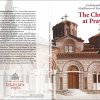Speaks English, French and German. Works as judge in Pančevo and Sombor. He was one of the editors of the professional publication "Pravna misao" (Thoughts in Law). At outbreak of WWII enters as volunteer, becomes POW in German officer's camp at Ösnabrick. After end of war enters into diplomatic service at the Ministry for Foreign Affairs and is consul and expert for property law in Chicago and later in New York. As an amateur photographer assists wife Olga in gathering documentation about the painter Milena Pavlovic Barilli during her New York period.
Vladan Bataveljić rodjen je 1906. u Kutlovu, okrug Kragujevac. Pravni fakultet u Beogradu završio je 1929. Na specijalizaciju odlazi u Grenobl, Francuska. Po završetku studija otvara advokatsku kancelariju u Poenkareovoj 32 u Beogradu. Vlasnik je i odgovorni urednik časopisa za literaturu i umetnost "Razmena" sa kancelarijom u Beogradskoj ul. 35. Bavi se pisanjem poezije, karikaturom i likovnom i literarnom kritikom.
Govori engleski, nemački i francuski. Radi kao sudija u Pančevu i Somboru. Jedan je od urednika profesionalnog pravnog časopisa "Pravna misao". Odlazi u rat kao dobrovoljac, biva zarobljen od strane Nemaca i do kraja rata provodi u oficirskom lageru Osnabrik. Zapošljava se u Sekretarijatu Inostranih Poslova posle rata i po službenoj dužnosti buva premešten u Čikago a zatim u Njujork kao konzul i stručnjak za imovinsko pravne odnose. Kao fotograf amater pomaže supruzi Olgi u prikupljanju gradje slikarke Milene Pavlović Barili u njenom njujorškom periodu.






